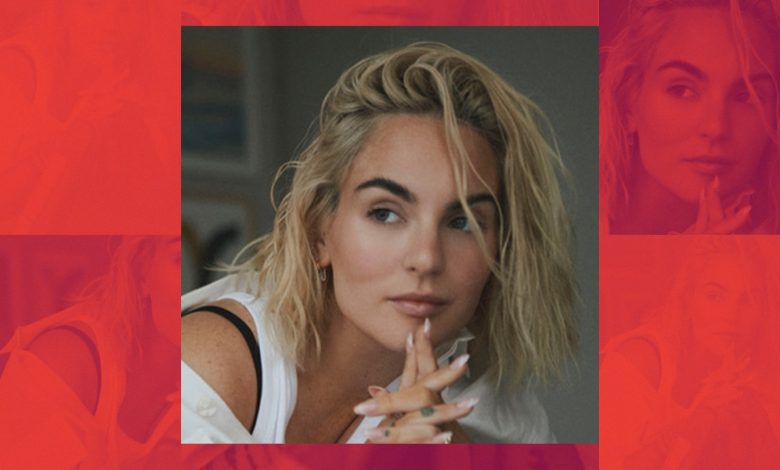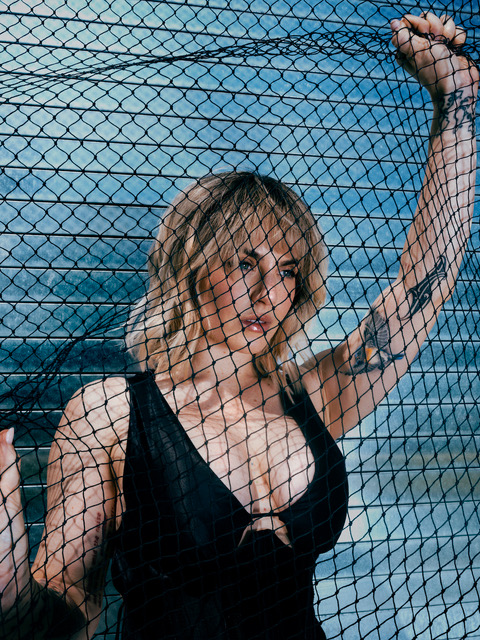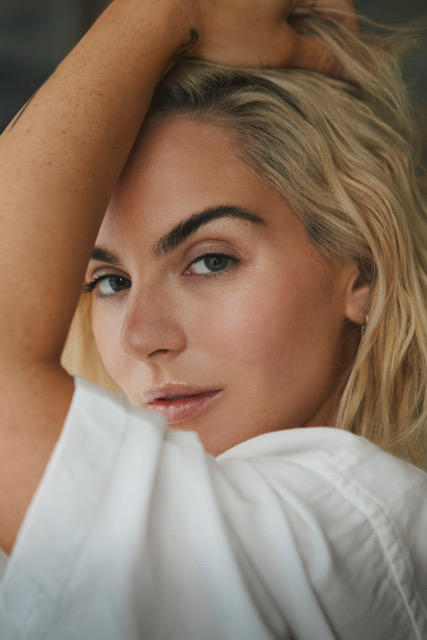JoJo on Her 20-Year Career, Being a Young Artist, New Music, Broadway

Joanna “JoJo” Leasque’s first album, JoJo, earned the singer her first platinum record. It scored a top five spot on the Billboard 200. And it was No. 1 on Billboard’s Pop Airplay chart.
She was all of 13 years old.
Now, with over 20 years in the industry, the 33-year-old is taking some time to reflect on her past and look ahead to her future. She’s spent the past year working in a variety of gigs, including writing her (presumably first) memoir, Over the Influence, and starring as Satine in a Broadway adaptation of Moulin Rouge!.
She’s also released a new single, “Porcelain,” in which the singer explores the idea of metamorphosis and leaving behind sadness.
“I think that I had to overcome all the influences and all the opinions and molding and shaping that was put on me from a young age and some of the pressure that I put on myself,” JoJo tells The Hollywood Reporter. “I think that it was a lot of unlearning and a lot of acceptance and a lot of perspective shifting, a lot of therapy.”
Below, JoJo opens up about her 20-year career, her thoughts on protections in the industry for young artists, why she rerecorded her albums and what she means when she says she’s “flirting with a lot of different things” at the moment.
This year is your 20th year in the music industry, that’s quite a feat no matter what, but certainly for someone of your age. How are you feeling about your career overall?
I feel incredibly grateful for all the different experiences that I’ve been able to have and for the opportunities that came in forms that I never expected, and for the ability to learn how to pick myself back up again and to reconnect with what it is that got me into this life in the beginning. I think that sometimes it takes a long time to unlearn things that we’ve learned, picked up along the way. I feel like I’m really, really enjoying this moment in my life with 20 years of being in the music industry and being old enough to know better and old enough to have some stories to tell, but also still young enough to have the time of my life.
With your new single, “Porcelain,” you said that it flirted with pop. What made you want to move a bit more in that direction?
I mean, I just feel flirty in general right now, so I’m just flirting with a lot of different things. I’m flirting with pop. I’m flirting with jazz. I’m flirting with alternative. I’m in a flirtatious era of just exploring different things that I’m curious about. This song, we actually wrote it to a live jam. I was in the booth and then my producer and the other musicians that we were working with were in the live room and Neff-U, my producer, was on the drums and then another person was on the keys and another person was playing the bass, and we just kind of freestyling, and then I was like, “Wait, what if we put it to that Uncle Luke sample?” And it was just a very free natural way. Then Little Eddie, my brother and my co-writer, he was like, “And what if we gave it like a Jersey house beat feeling?” So, it’s just a synthesis of a lot of different things that felt exciting to us. It’s not that I am intentionally heading in a pop direction, it’s just that I’m just more interested in what feels nice and what feels exciting and less about genre. I just want to get into my body and out of my head a little bit.

You spoke on the Las Culturistas podcast about this idea that people who are around your age come up to you and say, “Oh, your music is so nostalgic for me.” How do you process that on your end? How are you able to navigate that interaction?
It’s so nice to hear, but I find myself sometimes feeling a little tinge of defensiveness because I’m like, “Do y’all not know we’re the same age?” I don’t know. I think that sometimes people didn’t know that I was 13 when I came out. Sometimes I’m like, “You know we grew up together,” basically is what I end up feeling like saying. It’s nostalgic for me, too, because it was such a formative part of my childhood, my adolescence, and it almost feels like a different life, a different person, because that’s how much growth happens in 20 years, you’d hope. Every year it feels like, “Wow. That was then, this is now.”
Young people are so often vulnerable in the industry growing up. How did you feel protected as a young artist yourself growing up, and do you feel there are more protections now for younger artists?
My mom did her very best job to protect me, and she really did make sure that I had a balance of getting my education through my homeschooling on the road and everything, because I stopped going to a regular public school in seventh grade. Her priority was to make sure that I could go to college if I wanted to, and that I was going to be more of a whole person as opposed to a product. But I will say that there is no way to prepare a child for what fame does to the developing brain. I don’t think that the introduction of a drug like fame, adulation, validation, criticism, all those things really shape our sense of self, and I do think that this generation deals with it probably just as much as I dealt with it being a public figure, they probably deal with it now with social media because it’s like you feel like you’re being consumed, like you’re putting yourself out there to be consumed, and then you’re also consuming so much. If you don’t get enough likes, it’s like, “Am I even worthy?” Or if you do, then you might get high off that feeling. I think it really is a dangerous thing, particularly for a developing nervous system and sense of self.
I will say that the music industry is very different from film and television. The music industry is more like wild, wild, wild west, anything goes type of thing, and you really need to make sure that you have a support system in place because otherwise you’ll get chewed up and spit out, and that just is the nature of what that industry is. I’m really fortunate that I have very loving family and they supported me as best they could. It could have turned out a lot weirder. It turned out all right.

You’re about to finish up your second stint in Moulin Rouge on Broadway. How has the entire experience been for you? Do you feel it’s changed your outlook on anything in terms of your career or what risks you’re willing to take?
I think I needed to prove for myself at this point in my life that I could take on a challenge like that. When I took it on and I didn’t embarrass myself. I actually was proud of myself for the job that I did. I’ve spent a lot, a lot of time just shitting on myself and being like, you’re not good enough, and just having these negative thoughts that I’ll engage with before, so if other people say it, like, “Well, I’ve already cut myself down” and that’s just not the experience I’m having here because I know the hard work that goes into it. I know that I’m human, that if I miss a note or my voice cracks or if anything like that, it’s like, well, you’re going to do it another seven times, and you’re prepared, and you’re supported and you’re not alone.
It’s fair to say you’re a bit of a modern pioneer in terms of rerecording your old albums. It’s become a big conversation in recent years, and you see more artists talking about exploring that option for themselves. What are your thoughts on that and why was it so important to you?
It’s interesting because labels are catching on now, and now in the contracts of 2024 and beyond, they’re putting stipulations in there now so artists cannot go back and rerecord and cannot do what I did or what Taylor Swift very famously did a few years after. I think that the topic of ownership is really, really important, especially for artists who are interested in putting out music or thinking about signing a deal. For me, the reason why I re-recorded my first two albums was because they weren’t available on streaming services. There’s just a lot of interesting things that aren’t at the forefront of the conversation, obviously, because it’s boring and it’s kind of political music industry stuff, but every single label has to do a deal with the digital streaming platforms, and if they don’t, then your music’s not going to be on there.
Source: Hollywoodreporter
Related Posts
- Roundball Rocked: With NBA Return Looming, NBC Purges Scripted Roster
- SoundCloud Says It “Has Never Used Artist Content to Train AI Models” After Backlash on Terms of Service Change
- Fox News’ Camryn Kinsey Is “Doing Well” After Fainting on Live TV
- Kerry Washington and Jahleel Kamera in 'Shadow Force.'
Courtesy of Lionsgate
…
- This Alternative Artist Landed a Top-20 Chart Debut With an Album Made Almost Entirely on His Phone





